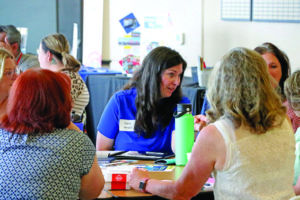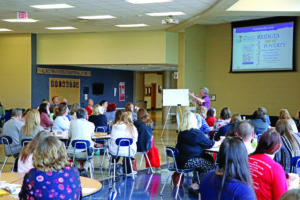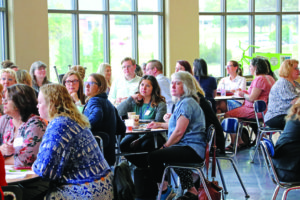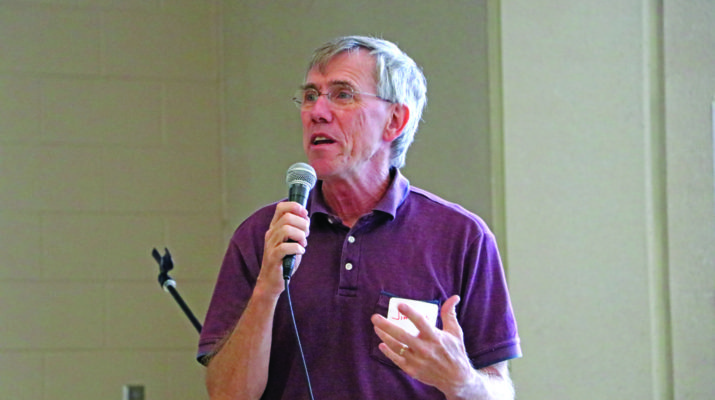People from across the Panhandle gathered at Alliance High School Thursday to take part in the third session of the Bridges Out of Poverty Program and learn how to better meet the needs of those in poverty.
Jim Ott, a presenter with the aha! Process Inc., gave a presentation on Wednesday evening at the West Side Events Center, and guided the training at AHS on Thursday. He commended the Alliance Poverty Task Force on their work. He said he thinks one of the biggest strengths in the region is having input and participation from multiple organizations.

“One of the things I appreciate about the Alliance Poverty Task Force, and the Panhandle Partnership is they didn’t just say, ‘Come in and talk once.’ They said, ‘ let’s talk about this for a year, or more, and continue to dive into these things.’ When a community takes that deep of an interest, you can start to really see things change,” said Ott.
Ott explained that the Bridges Out of Poverty Program can aid communities like Alliance.
“Bridges Out of Poverty is a community application of some work done by a lady named Ruby Payne,” Ott said. “In the mid ‘90s, she started with a framework for understanding poverty. Bridges Out of Poverty is born out of a theory if you take Ruby’s stuff and apply it to a community working with adults, you can achieve better outcomes for people from generational poverty.”
The work, Ott explained, has been shown to be effective in a multitude of case studies. He said the work revolves around changing the way to look at poverty.
“We all tend to judge people who are living in a way that’s different from us,” Ott said. “If we can get past that judgment and start asking different questions, we can begin to see that there’s patterns of behavior that allow people to survive in generational poverty that just become the way people live. In order for any of us to make a change, personally or as a community, we have to say, ‘Why are we living this way?’ and ‘Do we always want it to be this way?’”

Ott explained that traditional middle-class solutions to poverty are often ineffective as a long-term solution because it often involves people telling other people what to do.
“People don’t like being told what to do, as it turns out,” said Ott.
Poverty is a taboo topic in many communities, Ott explained. He said the best way to address it is to discuss it openly.
“There’s always some version of, ‘This is hard for us to talk about, because this is a threat to our community.’ But the reality is, if you don’t talk about it and address it, it will be more than a threat. While people in poverty are not morally depraved or manipulative, any more than anybody is manipulative, if you get too much poverty, the resources can’t meet the needs, and it begins to take more than it can contribute. Everything goes into poverty, which undercuts other things, and, eventually, it implodes on itself,” said Ott.
“What we’ve faced in rural areas is you drive by towns and you look at their former down towns, and there’s nothing there,” Ott said. “There’s no stores. There’s nothing. It just depends on where we are.”
Poverty leaves lasting effects on those who have experienced it. Ott noted that generational poverty, especially, lingers.

“There’s a difference between, you lost your job, and you don’t have money for a little bit, and, ‘my dad didn’t have a job, and his dad didn’t have a job.’ One of the lasting effects of generational poverty is a change in mind about how to solve problems, how to interact with people, what is work for, how language works. It becomes neurological. If we don’t understand that, we will attribute that to a bad attitude, to a lack of intelligence, to being lazy, or manipulative. For the most part, people are doing the best they can with what they know. That change in mindset has to be addressed. People in generational poverty have to see it for themselves. They can’t be told,” said Ott.
Ott explained that the first step to addressing poverty is to stabilize the environment, providing resources for food, shelter and clothing. Once the environment has been stabilized, opportunities need to be provided for people to engage in meaningful discussions.
“Change comes through relationship,” said Ott. “Period.”
He encourages people to open up dialogues with those experiencing poverty and to form relationships, which will lead to lasting change in the community.

